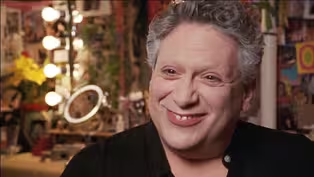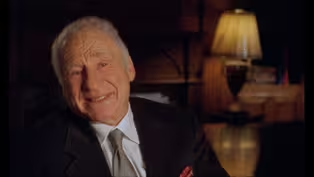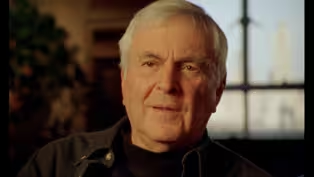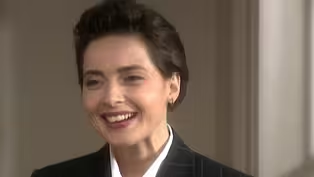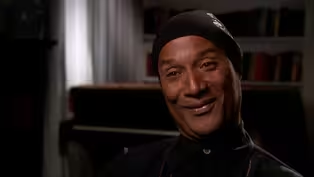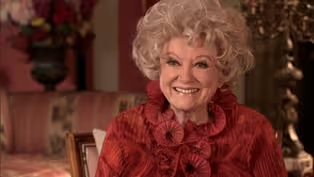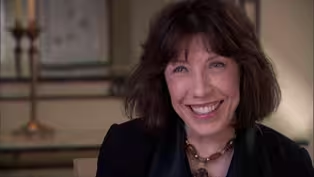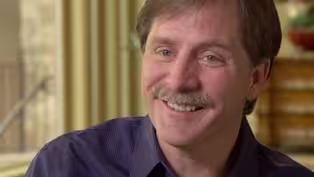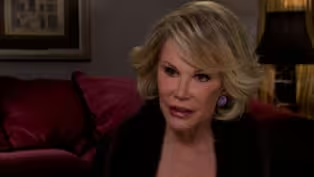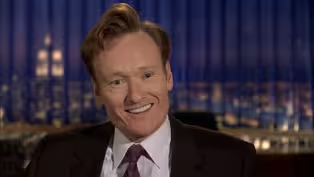
Jerry Seinfeld on his place in American sitcom history
Special | 16m 1sVideo has Closed Captions
Jerry Seinfeld discusses his collaboration with Larry David and the evolution of the sitcom.
On August 13, 2008, comedian Jerry Seinfeld discussed his collaboration with Larry David, the evolution of the American sitcom and the lure of stand-up comedy. Interview conducted by director Michael Kantor for the six-hour PBS comedy series, “Make ‘Em Laugh: The Funny Business of America” (2009).
Problems playing video? | Closed Captioning Feedback
Problems playing video? | Closed Captioning Feedback
Support for American Masters is provided by the Corporation for Public Broadcasting, AARP, Rosalind P. Walter Foundation, Judith and Burton Resnick, Blanche and Hayward Cirker Charitable Lead Annuity Trust, Koo...

Jerry Seinfeld on his place in American sitcom history
Special | 16m 1sVideo has Closed Captions
On August 13, 2008, comedian Jerry Seinfeld discussed his collaboration with Larry David, the evolution of the American sitcom and the lure of stand-up comedy. Interview conducted by director Michael Kantor for the six-hour PBS comedy series, “Make ‘Em Laugh: The Funny Business of America” (2009).
Problems playing video? | Closed Captioning Feedback
How to Watch American Masters
American Masters is available to stream on pbs.org and the free PBS App, available on iPhone, Apple TV, Android TV, Android smartphones, Amazon Fire TV, Amazon Fire Tablet, Roku, Samsung Smart TV, and Vizio.
Buy Now
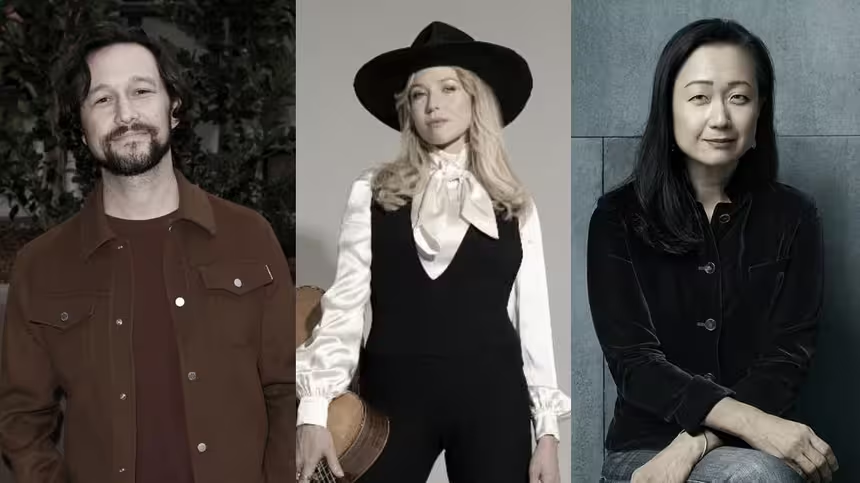
A front row seat to the creative process
How do today’s masters create their art? Each episode an artist reveals how they brought their creative work to life. Hear from artists across disciplines, like actor Joseph Gordon-Levitt, singer-songwriter Jewel, author Min Jin Lee, and more on our podcast "American Masters: Creative Spark."Providing Support for PBS.org
Learn Moreabout PBS online sponsorshipMore from This Collection
Watch curated interviews from The American Masters Digital Archive. The full collection includes over 1,000 hours of never-before-seen, raw interviews: a treasure trove of the movers and shakers of American culture, including Maya Angelou, Patti Smith, Mel Brooks, Carol Burnett, Matthew Broderick, Carl Reiner, Joan Rivers, Dionne Warwick, Lee Grant, Sidney Lumet, Betty White and many others.
Harvey Fierstein on gay representation on Broadway and its deep history
Video has Closed Captions
Harvey Fierstein talks to director Michael Kantor backstage during the production of "Hairspray." (13m 8s)
Video has Closed Captions
Ringo Starr describes his friendship with Mae West. (10m)
Mel Brooks' wild ride to his first Broadway show ever
Video has Closed Captions
Mel Brooks talks about the first Broadway show he ever saw—Cole Porter's "Anything Goes." (5m 44s)
John Kander and Fred Ebb on “Cabaret,” creativity and collaboration
Video has Closed Captions
Composer John Kander and lyricist Fred Ebb talk about how they have worked together. (5m 56s)
Isabella Rossellini compares her acting and modeling
Video has Closed Captions
Isabella Rossellini discusses her acting versus modeling career. (28m 24s)
Quincy Jones explains how he got started in music
Video has Closed Captions
Quincy Jones discusses his early career, friendships and how he defines himself. (15m)
Paul Mooney on his career and relationship with Richard Pryor
Video has Closed Captions
Paul Mooney reflects on the mechanics of stand-up and his role as Richard Pryor's best friend. (10m 39s)
How Phyllis Diller broke down the doors for female comics
Video has Closed Captions
Phyllis Diller reflects on how her comedy was a response to years of “take my wife” jokes. (11m 35s)
How Lily Tomlin found liberation in exploring her Laugh-In characters
Video has Closed Captions
Lily Tomlin speaks about her time on Laugh-In and how she developed her characters. (12m 35s)
Jeff Foxworthy on how every American might be a "redneck"
Video has Closed Captions
Jeff Foxworthy discusses regionalism in comedy and why "redneck" is a state of mind. (15m 41s)
Joan Rivers finds humor in being yourself
Video has Closed Captions
Joan Rivers speaks about her experience as a female comic in the early 60s. (9m 59s)
Conan O’Brien gets serious about silliness
Video has Closed Captions
Conan O’Brien speaks about his style of late night and his reason for doing comedy. (15m 32s)
Providing Support for PBS.org
Learn Moreabout PBS online sponsorship- The American idea of comedy is really born in New York with the Vaudeville and the Lower East Side and so many comedians coming out of that area, and it was, New York, you know, I always find the standup comedians that come outta New York seem to be nicely roughed up.
They're not too nurtured, but just enough, and I think it's always kind of been that thing in New York.
It's not the easiest, most comfortable place to live, and that's a good state of being for comedy.
This is not gonna be easy, ever.
It's never really gonna feel comfortable, ever.
There are moments where you feel comfortable, but you have to get used to the idea.
In New York, when you wake up in the morning and you leave the house, you gotta get used to the idea that it's either gonna be 100% humidity, zero degrees, that really kind of gloppy slush.
I mean, it's just getting where you want to go is not gonna be that easy, sometimes, but most times, not, and that's a good mindset.
There's no great comedy coming out of beach communities.
I have a friend that told me he was gonna go to the beach and he was gonna write something.
I go, it's gonna suck.
If you go to the beach and write, it's gonna suck, 'cause the beach is no place to write.
There's no great comics coming outta Bora Bora.
It's not a funny place.
America really defined the first moment in human culture where we really created a context for upward mobility.
I mean, that was the whole idea of America.
Let's have a place where you rise and fall based on your ability and eliminate the class system.
So people were encouraged to kind of step up, and let's see what you have, and that is the comedic metaphor, really, is if you think you can do this, go ahead.
Standup comedy is wide open.
You don't have to know anybody.
You don't have to have connections.
You don't have to be trained.
It's the only job where you start off doing it.
It's like if you wanted to be a surgeon, they don't go, well, here's the knife, start cutting, and keep cutting until the guy feels better, but that's how you start your standup career.
They just go, well, get up there.
So, and I think Americans kind of like that.
That's our country.
That's what we love about it.
It's like, you wanna do something?
Go ahead, try it.
If you can do it, you're in, you can't, you're out.
Well, I always wanted to be a comedian since I was watching comedians on television as a kid.
Watching Ed Sullivan, and you'd see these guys come out in their suits and tuxedos and these grown men acting silly.
I mean, I just fell in love with it.
I just thought, what a fun, funny kind of grownup to be, 'cause when I was a kid, I was looking at all the grownups, you think, well, what kind of grownup should I be?
What should I do?
And those guys, you know, and I also like the simplicity and the aloneness of it, the solitariness of it was kind of appealing.
It's just like, there's nobody around you.
There's nobody helping or hurting you.
I started doing it in the city in the seventies, and I was working at this place on West 44th Street, which was kind of a bar for the theater crowd, and they used to have like, a talent show Tuesdays and Thursday nights, and it was mostly singers, and they would have a few comedians, and it was really just a restaurant, and they would take out a table, and they had one light that they would aim to that empty space, and I think I went on there.
It was one of my second or third times ever on stage.
There was no stage.
It was just the floor, and I did this one routine about being left-handed, and the audience applauded.
It was like 20 people or something, but it was so shocking to me, and I froze and blanked right there that I had reached these people with some I silly idea I had in this not great setting anyway, but I had reached them, and it's just powerful.
It was just powerful.
I felt like, hey, I made somebody laugh, and it just seemed like a great thing to spend your life doing.
If you were a comedian starting out in 1935, you'd get an agent and you go, we gotta get you some writers.
We gotta come up with a hook.
Your agent's gonna figure out who you are, and so that era that I came up in, it was like, you gotta figure out who you are.
You do it.
I mean, you could see the triangulation there of Robert Klein, Woody Allen, SNL, Laugh-In, George Carlin, and all this kind of authorship of comedy.
It's like, come and write it yourself, do it yourself, but actually seemed Eden-like to me from the beginning, because there were all these great, funny, interesting people hanging around these places, and we'd all go on every night, and everybody would watch everybody, and then at the end of the night, which was usually three in the morning, we'd all go off and have breakfast at the Green Kitchen on First Avenue, and you were like in this club, and you were gonna see everybody every night.
I mean, we would never go out to bars or like, there was a big disco scene, of course, at that time in the scene, but nobody had the slightest interest in, I think I can get us into Studio 54.
We don't wanna go to Studio 54.
We got our own thing going here.
We had like our own party, and it wasn't this, you know, you read about guys in the fifties and sixties coming up in the strip joints and having people throw things at you.
It wasn't that kind of environment.
It was pretty supportive.
The audiences were interested in these young kids doing comedy, and they came to see them, and New York, in those days, people stayed out late.
I don't know how they kept their jobs, but there was always a good crowd at one o'clock in the morning.
That's not late.
It wasn't late.
Two, three, 3:30, that was kinda late, but 12 to two, no, still good crowds.
I don't know how people got up in the morning and went to work.
- [Producer] Larry David's early standup, what might happen when he'd come on stage?
Apparently it was very unpredictable.
- Yeah, well, he didn't have that kind of roll-with-it thing that you need in nightclubs in front of drunks in that time, but I was always a material guy.
It's like, what kind of material does the person have?
And he was always known to have very interesting and original material, and most of the people I knew would always go in to watch him perform, one, because you didn't know what was gonna happen, because if the audience didn't quite catch on to his thing, he became unhappy and would leave, which is what everybody else wants to do, but doesn't, but he would just do it.
He would just leave.
He'd go, all right, that's it, and he'd be on for two minutes and go, that's enough.
I knew him in the standup days, and whenever we would bump into each other, within 10 seconds, we would be having a funny conversation, and it didn't matter what was going on.
I would just walk up and go, oh, orange juice, huh?
And we'd be off on orange juice.
We would talk about it, and then he said, "This is what the show should be."
I had told him that NBC was interested in me doing a show, and he said, "You should do a show like this."
Those kinds of conversations that people have in between when they're really talking about something, and we really would not settle for anything that we didn't absolutely love.
So we were a good team that way, and we just loved to talk.
We love to talk with each other.
Our minds were just like, connected, and they were like, just sparky.
We would spark each other.
So that's what you want for a writing partner is like, everything he said would spark something in me and vice versa, and it was easy for us to write.
We never struggled.
It was never like writer's block or sitting around going, I don't know.
We would just sit down and it would happen.
It was pretty fantastic.
Larry and I loved to talk about little things and explore them to death, and we thought that's the kind of stuff that people liked to eavesdrop on.
They like to listen.
People would listen to Larry and I talk.
So that's what it was.
I mean, it was very New York Jewish kind of mindset to it, and there was a lot of people in the network that didn't think that that would be accessible to the average audience, but it's always been.
I mean, comedy's always come from that.
All comedy, to me, is essentially the same if I like it.
It's about finding something original and dismantling it completely till there's nothing left to say about it.
That once you've discussed it, there's no one else gonna discuss it, because there's nothing left to say.
A lot of sitcom stars come from standup, because you have to be kind of a formed comedic persona.
That's the best starting point for a sitcom.
To create a character in a room with writers is never going to have the dimension and depth that a comedian has already done that work for 10 or 15 years in in nightclubs.
So he kind of knows the funny way that he talks or the funny things for him to talk about and also the discipline of comedy, you already have that too, and the standup and the sitcom, they're very similar in the discipline that they have to have, standup more so.
So if you can do standup, doing a sitcom is like, it's kind of relaxing.
We had already kind of applied our standup sensibility to the show, which was the first scene, the first line, let's try and get a laugh, and let's get a laugh all throughout the scenes and all the way to the end, and the worse it gets for the characters the better, 'cause that's funnier.
It was just like, whatever's funny, and we didn't really care about people particularly relating to the characters or admiring them or understanding them.
It was just the characters were just props for the jokes.
So it was a standup discipline that we brought to it.
It's just let's just make this as funny as we could.
The idea of a sitcom is it's a situation comedy, which is the situation is very funny.
That's where the comedy comes out of, and when you go off that, then that's not really a sitcom.
We used to have this term, actually, I heard NBC executives use it, they used to call it a warmedy, which is the most disgusting idea to me of like a heart-warmingly funny thing.
It's just like, oh, please.
Who's got time for that?
At the end of the day, you're tired.
You're aggravated.
Come on with something funny.
(chuckles) Warmedy, ugh.
Every show that we did was, even in the beginning, was a little off, a little weird, a little different.
I don't think we really changed the sitcom format that much.
In fact, I think we really brought it back to what it was.
I think we had more in common with I Love Lucy and The Honeymooners than all the shows, than the Cheers and Mary Tyler Moore, and those shows really were more evolved.
We kind of devolved back to just funny.
I mean, I think Larry David's done done a great job with Curb Your Enthusiasm.
I think Tina Faye's show, 30 Rock, is really contemporary and funny and interesting, but that group hug thing where you get the whole country and is so hard to do, and if you look back over time, there's only a handful that have done it.
Sitcoms generally used to try and make the whole country laugh, and it's kind of hard to do that because of the culture has kind of segmented its interests.
Well, I'm interested in this.
I Google searched this.
This is what I like.
So that's the world that we live in now, and that makes it hard for that type of sitcom, but I don't think there are no funny sitcoms.
It's just hard to get your arms around everybody now.
We never did try to do that.
It just happened.
I don't know.
I think because it was the last moment before everybody went to the computer.
You still had most people looking to the television for entertainment.
Television has never had competition before.
This is the first time it's like somebody's come along and says, I'm as good as you, better, and that's the internet.
So that competition is really, which is kinda like the American automobile industry in the sixties and seventies, they had no competition.
We make it, you buy it, end of story.
That's over now.
That's over.
So I think, to me, I find an interesting analogy between the American automobile industry and the television industry is gigantic, dominant, commercial ventures that have never had competition, don't know how to deal with competition, suddenly getting real competition.
So that's what's happened.
I think all the walls are breaking down, and in comedic terms, I don't think this is necessarily a good thing, because I think comedy thrives on discipline and kind of collapses with too much freedom, because it's the restriction sometimes that makes something funny, and that's another thing that I believe in in comedy is that structure and discipline is what makes the madness funny.
Madness without boundaries is like tennis without lines.
If it doesn't matter where you hit the ball, then what's the game?
There's no game here.
I don't want people to appreciate anything about comedy.
It's like the guy comes to fix the plumbing, just fix it.
This is what I've learned is that people, just do the thing that makes us laugh.
Just do that.
We don't need to know anything else about it.
Support for PBS provided by:
Support for American Masters is provided by the Corporation for Public Broadcasting, AARP, Rosalind P. Walter Foundation, Judith and Burton Resnick, Blanche and Hayward Cirker Charitable Lead Annuity Trust, Koo...

